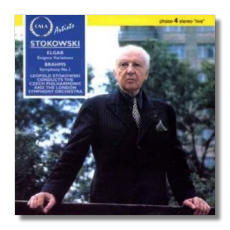
The Internet's Premier Classical Music Source
Related Links
- Latest Reviews
- More Reviews
-
By Composer
-
Collections
DVD & Blu-ray
Books
Concert Reviews
Articles/Interviews
Software
Audio
Search Amazon
Recommended Links
Site News
 CD Review
CD Review
Stokowski Conducts Elgar & Brahms

- Edward Elgar: Variations "Enigma" Op. 36 (1899)
- Johannes Brahms: Symphony #1 in C minor, Op. 68 (1876)
Czech Philharmonic Orchestra/Leopold Stokowski (7 & 8 September 1972)
London Symphony Orchestra/Leopold Stokowski (15 June 1972)
Cala CACD0524
It took an Americanized English conductor working as a guest with a Czech orchestra to unlock Elgar's Enigma for me. For the most part I do not appreciate Elgar. I find his music too "stiff upper lip" and all that. My other recording of the work is by no less than Sir John Barbirolli. In comparing the two I find that Stokowski is consistently more "emotional". The strings are fuller, the details more detailed. This is probably due, in part, to the Phase 4 recording techniques, but as it was from a live performance, I am not sure how it was engineered. Edward Greenfield, in his review of the 60th Anniversary concert (see below) mentions having "seen microphones in evidence" (mick-ro-phones as Stokowski pronounced it) and I am certain the same was true in Prague. Whatever the case, this is a wonderful performance and recording. It belongs in the collection of every serious collector of classical music.
How does the old magician do it? Well, for one thing it sounds like he has about one hundred double basses. Stokowski was known for bringing his sound from the double bass to the cellos to violas, etc. This organ like atmosphere is part of the magic. He also tends to lean into a phrase, pulling more emotion from it. You can hear this in the very opening "swoon" of the violins in the beginning. I knew when I heard just those opening bars that this was a special recording. The individual details are well voiced and clear. I have never heard the solo clarinet in variation 13 sound so plaintive. It sounds as if the Czech Philharmonic is enjoying the experience. (I wonder how often they played Elgar in the 70s?) [After writing this, I happened to read Edward Johnson's excellent notes for the CD. Apparently the Czech Philharmonic had never played it before. ] I can imagine the audience going nuts at the finale's powerful, dark close. I think it is that very darkness that I love about this performance.
The Brahms was taken from the 60th Anniversary concert of that year. At that concert Stokowski repeated the performances he made with the London Symphony in 1912. It consisted of Wagner's Meistersinger Prélude, Debussy's Prélude to the Afternoon of a Faun, Glazunov's violin concerto (currently available on London Phase 4), Debussy's Prélude to the Afternoon of a Faun, this Brahms symphony and an encore with Tchaikovsky's Marche Slave. I must be honest. This is not my favorite Brahms 1stby Stokowski. I prefer Stokowski's All-American Youth Orchestra recording (issued by the Leopold Stokowski Society of America and later by Music and Arts). It is more incisive in attack and the opening timpani is more powerful. In this London Symphony recording the timpani is recessed and the playing smoother, slightly less involving.
At the same time, I should also mention some of the comments made in the review mentioned above. Talking about the Wagner Mr. Greenfield says, "… the interpretation has all the rich sense of flow one expects of Stokowski…" The same is true of the Brahms. About the Brahms in particular I also have to agree with him as he comments, "… over and over again his shading of texture… is a revelation… I had never appreciated before the role of the double bassoon in Brahms Symphony #1 and that comes out on the disc too." In other words, my reservations are minor.
For what it is worth, there is another CD release of the Brahms 1st. It is on a Japanese Phase 4 issue, available only in Japan. It is from the concert the night before this one, however, and the transferred sound is not listenable. This is much to be preferred. The sound is much fuller and easier on the ear. I found the Japanese release inferior to the older Intaglio release (nla).
I'd recommend this disc for the Elgar alone. Listening to this I think that Stokowski might have helped me appreciate Elgar more and I wish he had recorded the symphonies. It is odd that Stokowski performed so little "English" music in his life. He did conduct the U.S. première of Symphony #2 when in Cincinnati. It is puzzlement.
Copyright © 1999, Robert Stumpf II



















